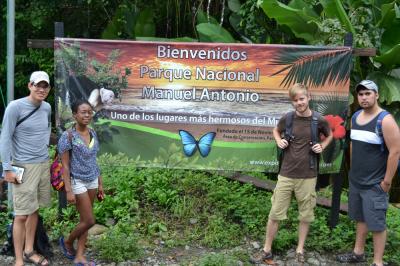NMSU students explore sustainable tourism in Costa Rica

Costa Rica is understandably a prime destination for eco-tourists, and has much to teach about developing a sustainable tourism industry.
Two New Mexico State University students had the opportunity last summer to spend three weeks in Costa Rica participating in the first summer Sustainability Seminar Series offered by CATIE, the Center for Tropical Agricultural Research and Higher Education near Turrialba.
The topic of this year's seminar was sustainable tourism.
Jared Dial and Denisha Gahie were in Costa Rica July 10-Aug. 2 for the program, which covered the basics of sustainability, globalization, environmental policy, population trends, food webs, energy systems and green business models.
Dial finished an NMSU undergraduate degree in hotel, tourism and restaurant management in 2010 and went on to an environmental tourism internship in Washington state. He is currently back at NMSU, taking prerequisites for graduate school in anthropology and working in NMSU's Office of Sustainability.
"Costa Rica is a world leader in sustainability and in sustainable tourism development," he said. He felt the opportunity to spend time there gaining an international perspective on those topics was a perfect next step for him.
In addition to the academic work, Dial said the highlights of the program were weekend field trips.
Gahie is working on undergraduate degrees in criminal justice and communication studies. While sustainable tourism is not a component of either major, it is a personal interest of hers. She said she earned communication studies credit for the seminar.
Much of the material was new to her, but she said the instructor was great about explaining the concepts and getting the students prepared to make the most of their excursions.
"Costa Rica was really our textbook," she said. "The program was set up so that much of the learning came from direct experience."
The students visited a sustainable dairy and cheese operation, worked with a non-governmental organization at a sea turtle egg preserve, and got an inside look at a "five-leaf" hotel that combines upscale accommodations with a rigorous sustainability campaign.
Gahie said that one of the requirements of the class was for the group to develop a strategy for enhancing the viability of eco-tourist destinations like the ones they visited. They needed to consider the target audience, what area attractions to feature, other marketing aspects and logistics, among other things.
NMSU has a long history of working with CATIE, dating back to the days when Gerald Thomas was president of the institution.
The relationship got a boost in January when an NMSU delegation led by Executive Vice President and Provost Wendy K. Wilkins visited the campus.
"We would like for NMSU to be CATIE's premier partner in the United States," Wilkins said after signing a collaboration agreement between the two institutions. "Our missions are very closely aligned, especially in connection to agricultural extension and research. This now extends to work on sustainability, energy and the environment."
Daren Bloomquist, college assistant professor in NMSU's School of Hotel, Restaurant and Tourism Management, is a sustainable tourism expert. He coordinated NMSU's participation in the seminar and was able to join the students for part of the program.
"Our students came away from their three weeks in Costa Rica with knowledge and experience that will not only improve their personal lives, but will also allow them to encourage the adoption of sustainability principles in their workplaces and their communities," Bloomquist said.
Dial has a few words of advice for future participants in CATIE's Sustainability Seminar Series: "Go with a fully open mind, eliminate stereotypes, and embrace the local culture."
The students in the program developed a blog about their experiences, which can be seen at http://fromcatie.blogspot.com/


